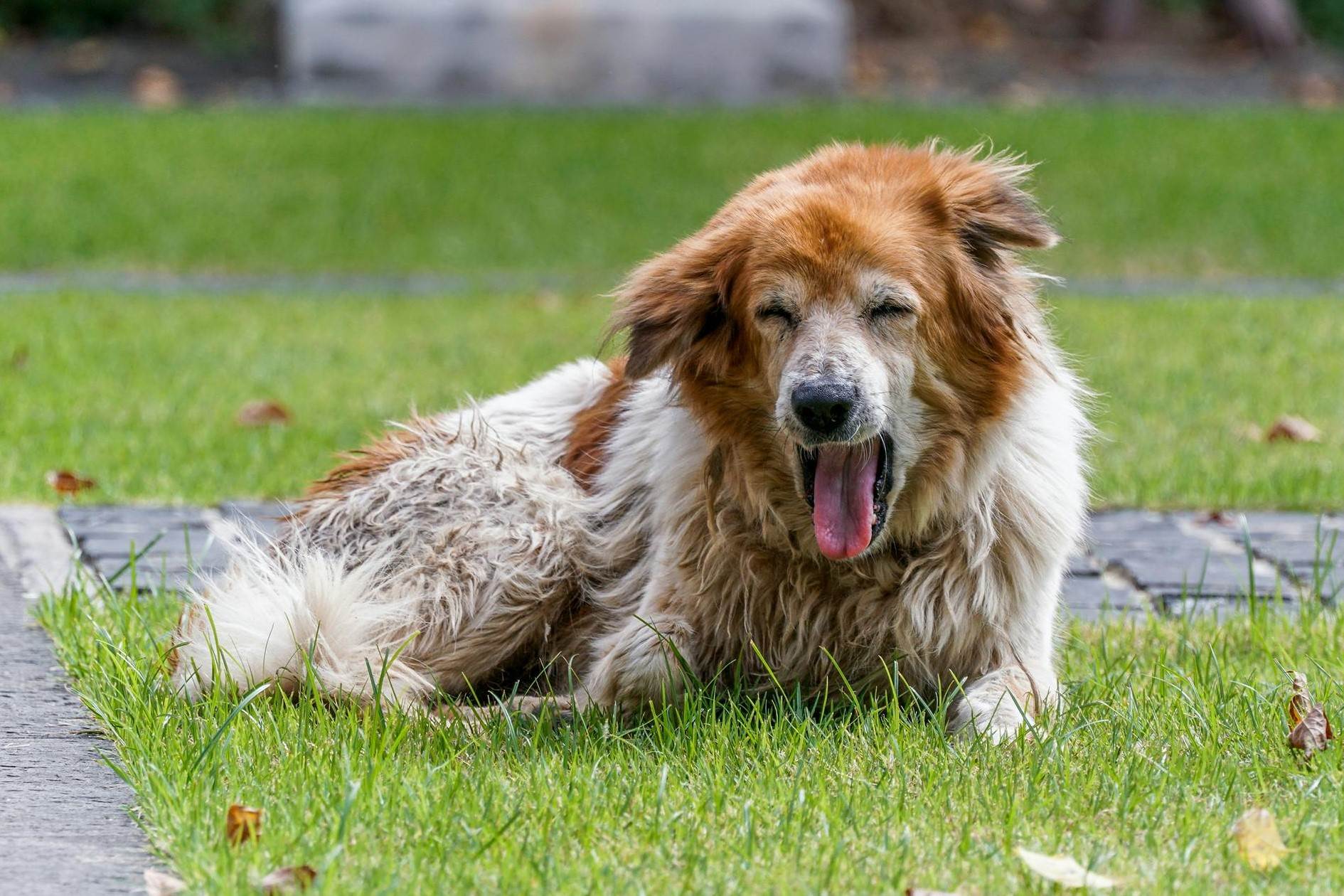Home>Health and Wellness>5 Steps To Help Your Dog Stop Dry Heaving


Health and Wellness
5 Steps To Help Your Dog Stop Dry Heaving
Published: February 8, 2024
Discover 5 expert tips to alleviate your dog's dry heaving and improve their health and wellness. Take the first step towards a happier, healthier pet today!
(Many of the links in this article redirect to a specific reviewed product. Your purchase of these products through affiliate links helps to generate commission for Noodls.com, at no extra cost. Learn more)
Table of Contents
Introduction
Dry heaving, also known as retching, is a distressing experience for dogs and their owners. It's characterized by the act of trying to vomit without bringing anything up. This can be a concerning symptom and may indicate an underlying health issue that needs attention. As a responsible pet owner, it's crucial to understand the potential causes of dry heaving in dogs and learn how to address this issue effectively.
In this comprehensive guide, we will explore the steps you can take to help your dog stop dry heaving and improve their overall well-being. By following these practical strategies, you can provide your furry companion with the care and support they need during this challenging time.
Understanding the underlying reasons for your dog's dry heaving is the first step toward finding a solution. From dietary issues and dehydration to stress and medical conditions, there are various factors that can contribute to this distressing symptom. By delving into each potential cause, we can gain a deeper insight into how to alleviate your dog's discomfort and promote their recovery.
Through a combination of proper nutrition, hydration, stress management, and professional veterinary advice, you can empower yourself to take proactive measures in addressing your dog's dry heaving. Together, let's embark on this journey to support your beloved canine companion and help them overcome this challenging health issue.
Read more: How To Stop Your Dog From Eating Cat Poop
Step 1: Identify the Cause of Dry Heaving
When your dog experiences dry heaving, it's essential to identify the underlying cause to address the issue effectively. Several factors can contribute to this distressing symptom, ranging from minor issues to more serious health concerns. By paying close attention to your dog's behavior and considering various potential triggers, you can gain valuable insights into the root cause of their dry heaving.
Potential Causes of Dry Heaving
-
Gastrointestinal Discomfort: Digestive issues such as gastritis, inflammatory bowel disease, or gastrointestinal obstructions can lead to dry heaving in dogs. These conditions may cause discomfort and irritation in the stomach and intestines, prompting the dog to retch without producing vomit.
-
Dietary Indiscretion: Dogs are notorious for their curious eating habits, and consuming inappropriate or indigestible items can result in dry heaving. Whether it's scavenging spoiled food, ingesting foreign objects, or overeating, dietary indiscretion can lead to gastrointestinal upset and subsequent retching.
-
Respiratory Problems: Respiratory issues, such as kennel cough, pneumonia, or tracheal irritation, can trigger episodes of dry heaving in dogs. These conditions may cause irritation in the respiratory tract, prompting the dog to exhibit retching behavior as a response to the discomfort.
-
Anxiety and Stress: Dogs can experience stress and anxiety due to various factors, including changes in their environment, separation from their owners, or exposure to loud noises. This emotional distress can manifest as dry heaving, as the dog's physiological response to stress may involve gastrointestinal discomfort and retching.
Observing Your Dog's Behavior
To identify the cause of your dog's dry heaving, observe their behavior closely. Look for any accompanying symptoms such as lethargy, loss of appetite, abnormal bowel movements, or signs of distress. Additionally, consider any recent changes in their environment, diet, or routine that may have contributed to their discomfort.
By paying attention to these details and noting any patterns or triggers associated with your dog's dry heaving episodes, you can provide valuable information to your veterinarian, facilitating a more accurate diagnosis and targeted treatment plan.
Seeking Veterinary Guidance
If your dog's dry heaving persists or is accompanied by concerning symptoms, it's crucial to seek professional veterinary guidance. Your veterinarian can conduct a thorough examination, perform diagnostic tests, and recommend appropriate treatment based on the underlying cause of the dry heaving.
By collaborating with your veterinarian, you can gain valuable insights into your dog's health and well-being, ensuring that any underlying issues contributing to the dry heaving are promptly addressed.
Identifying the cause of your dog's dry heaving is a critical first step in alleviating their discomfort and promoting their overall health. By remaining attentive to your dog's well-being and seeking professional guidance when needed, you can take proactive measures to support your beloved canine companion through this challenging experience.
Step 2: Provide Proper Nutrition
Proper nutrition plays a pivotal role in supporting your dog's overall health and well-being, including addressing issues such as dry heaving. By focusing on providing a balanced and nutritious diet, you can help alleviate gastrointestinal discomfort and promote digestive health in your canine companion.
Importance of Balanced Nutrition
A well-rounded diet is essential for dogs to maintain optimal health and function. Ensure that your dog's meals contain high-quality protein sources, essential fatty acids, vitamins, and minerals. Opt for commercial dog food that is formulated to meet the nutritional needs of your dog's specific life stage and breed size. Alternatively, consult with a veterinarian to create a customized feeding plan tailored to your dog's individual requirements.
Dietary Considerations for Dogs with Dry Heaving
When addressing dry heaving in dogs, it's important to consider dietary factors that may contribute to gastrointestinal distress. Avoid feeding your dog table scraps or foods that are high in fat, spices, or preservatives, as these can exacerbate digestive issues and trigger episodes of dry heaving. Opt for easily digestible and high-quality dog food that is free from potential allergens or irritants.
Hydration and Moisture Content
In addition to solid nutrition, adequate hydration is crucial for supporting your dog's digestive system. Ensure that your dog has access to clean and fresh water at all times, as dehydration can exacerbate gastrointestinal discomfort and contribute to dry heaving. Incorporating moisture-rich foods such as wet dog food or adding water to dry kibble can also help maintain proper hydration levels and promote healthy digestion.
Read more: How To Stop Dogs From Whining
Transitioning to a New Diet
If you decide to change your dog's diet as part of addressing their dry heaving, it's important to do so gradually. Abrupt dietary changes can lead to gastrointestinal upset and further exacerbate the symptoms. Gradually introduce the new food by mixing it with the current diet over the course of several days, allowing your dog's digestive system to adjust and minimize the risk of digestive disturbances.
Monitoring and Adjusting the Diet
After implementing dietary changes, closely monitor your dog's response to the new food. Pay attention to any changes in their digestive function, appetite, and overall well-being. If the dry heaving persists or if you notice any adverse reactions to the modified diet, consult with your veterinarian to make necessary adjustments and explore alternative nutritional approaches.
By prioritizing proper nutrition and making informed dietary choices for your dog, you can contribute to their digestive health and overall comfort. A balanced and suitable diet, coupled with adequate hydration, forms the foundation for addressing dry heaving in dogs and promoting their long-term well-being.
Step 3: Keep Your Dog Hydrated
Ensuring proper hydration is essential for supporting your dog's overall health, particularly when addressing issues such as dry heaving. Adequate water intake plays a crucial role in maintaining healthy digestion, regulating body temperature, and supporting vital bodily functions in dogs. By prioritizing hydration, you can contribute to your dog's well-being and help alleviate gastrointestinal discomfort.
Importance of Hydration
Water is a fundamental nutrient that is essential for dogs to thrive. It facilitates the transportation of nutrients, aids in the elimination of waste products, and helps regulate various physiological processes within the body. Proper hydration is especially important for supporting digestive function, as it helps maintain the moisture content of the gastrointestinal tract and supports the breakdown and absorption of nutrients from food.
Monitoring Water Intake
Monitor your dog's water intake to ensure they are consuming an adequate amount of water based on their size, activity level, and environmental conditions. Factors such as hot weather, physical activity, and certain medical conditions may increase the need for hydration. Keep an eye on the water bowl to gauge your dog's drinking habits and refill it with fresh water regularly.
Signs of Dehydration
Be attentive to signs of dehydration in your dog, which may include dry gums, lethargy, sunken eyes, and decreased skin elasticity. If you suspect that your dog is dehydrated, encourage them to drink water and consider adding moisture-rich foods to their diet. Additionally, seek veterinary attention if dehydration persists or if your dog exhibits concerning symptoms related to inadequate hydration.
Hydration Strategies
Incorporate moisture-rich foods into your dog's diet, such as wet dog food or adding water to dry kibble, to increase their overall fluid intake. Additionally, consider offering ice cubes or frozen treats made from diluted low-sodium broth to provide a refreshing and hydrating option, especially during warmer weather.
Access to Fresh Water
Ensure that your dog has constant access to clean and fresh water throughout the day. Regularly clean and refill their water bowl to maintain water quality and encourage regular hydration. When traveling or engaging in outdoor activities with your dog, bring an adequate supply of water to prevent dehydration, particularly in unfamiliar or challenging environments.
By prioritizing hydration and implementing proactive strategies to support your dog's water intake, you can contribute to their overall well-being and aid in addressing issues such as dry heaving. Proper hydration complements a balanced diet and forms a foundational element in promoting your dog's digestive health and comfort.
Step 4: Minimize Stress and Anxiety
Addressing your dog's stress and anxiety is a crucial aspect of managing and alleviating episodes of dry heaving. Dogs, like humans, can experience emotional distress due to various factors, including changes in their environment, separation from their owners, exposure to loud noises, or unfamiliar situations. This emotional turmoil can manifest as gastrointestinal discomfort and contribute to episodes of dry heaving. By prioritizing strategies to minimize stress and anxiety, you can create a supportive and calming environment for your dog, promoting their overall well-being.
Understanding Stress Triggers
Identifying potential stressors that affect your dog is the first step in addressing their emotional well-being. Pay attention to their behavior in different situations and observe any signs of distress or unease. Common stress triggers for dogs may include thunderstorms, fireworks, visits to the veterinarian, changes in routine, or being left alone for extended periods. By recognizing these triggers, you can take proactive measures to mitigate their impact on your dog's emotional state.
Creating a Safe Haven
Establish a safe and comfortable space within your home where your dog can retreat to when feeling stressed or anxious. This designated area, such as a cozy bed or a quiet corner, should be a calming sanctuary where your dog feels secure and at ease. Encourage positive associations with this space by providing toys, blankets, or familiar scents that offer comfort and reassurance during times of distress.
Calming Techniques
Explore calming techniques and activities that help soothe your dog's nerves and promote relaxation. This may include gentle massage, soothing music or white noise, aromatherapy with dog-safe essential oils, or the use of pheromone diffusers designed to alleviate stress in dogs. Additionally, consider incorporating regular exercise and interactive play sessions to release pent-up energy and reduce anxiety levels.
Read more: How To Stop A Dog From Digging
Consistent Routine and Predictability
Maintaining a consistent daily routine can provide a sense of predictability and stability for your dog, reducing the likelihood of stress-related episodes. Establish regular feeding times, exercise routines, and sleep schedules to create a structured environment that promotes a sense of security. Consistency in daily activities can help alleviate anxiety and contribute to your dog's emotional well-being.
Positive Reinforcement and Support
Utilize positive reinforcement techniques to encourage calm and confident behavior in your dog. Reward moments of relaxation and composure with treats, praise, and affection, reinforcing a positive emotional state. Additionally, offer reassurance and support during challenging situations, demonstrating empathy and understanding to help your dog feel secure and comforted.
By implementing these strategies and prioritizing your dog's emotional well-being, you can minimize stress and anxiety, thereby reducing the likelihood of dry heaving episodes. Creating a nurturing and supportive environment for your dog fosters a sense of emotional balance and tranquility, contributing to their overall health and happiness.
Step 5: Seek Veterinary Advice
Seeking veterinary advice is a crucial step in addressing your dog's dry heaving, especially if the episodes persist or are accompanied by concerning symptoms. Your veterinarian is a trusted partner in safeguarding your dog's health and well-being, possessing the expertise to conduct a comprehensive evaluation, diagnose underlying issues, and recommend tailored treatment strategies.
Upon consulting with your veterinarian, they will perform a thorough physical examination to assess your dog's overall health and identify any specific signs or symptoms related to the dry heaving episodes. Diagnostic tests, such as blood work, fecal analysis, or imaging studies, may be conducted to gain further insights into potential underlying conditions affecting your dog's gastrointestinal or respiratory function.
Based on the findings from the examination and diagnostic tests, your veterinarian can provide a precise diagnosis and develop a targeted treatment plan tailored to your dog's individual needs. This may involve addressing specific health issues, such as gastrointestinal disorders, respiratory conditions, or stress-related concerns, that contribute to the dry heaving episodes.
In addition to treatment recommendations, your veterinarian can offer valuable guidance on preventive measures and long-term management strategies to support your dog's ongoing health and well-being. This may include dietary adjustments, stress management techniques, or lifestyle modifications aimed at minimizing the risk of recurrent dry heaving and promoting your dog's overall comfort.
Furthermore, your veterinarian can address any questions or concerns you may have regarding your dog's health, offering personalized advice and support to help you navigate the challenges associated with managing your dog's condition. Their expertise and compassionate care can provide reassurance and confidence as you work towards improving your dog's quality of life.
By collaborating with your veterinarian, you can gain valuable insights into your dog's health and well-being, ensuring that any underlying issues contributing to the dry heaving are promptly addressed. With their guidance and expertise, you can make informed decisions and take proactive measures to support your beloved canine companion through this challenging experience.
Seeking veterinary advice is an essential component of your dog's healthcare journey, empowering you to make informed decisions and provide the best possible care for your furry friend. Your veterinarian's dedication to your dog's well-being serves as a cornerstone in promoting their health and happiness, reinforcing the bond between you and your beloved canine companion.










